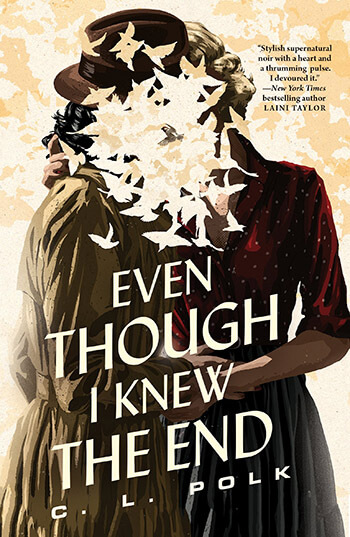“I need you to find the White City Vampire…”
It was supposed to be a quick job. All Helen Brandt had to do was examine the crime scene, maybe take some photos (after performing an augury and casting a spell to make the blood traces visible during the moon’s Chaldean hour. You know, the usual). If everything went to plan she could still make her date with Edith, a woman who did not deserve to be stood up, especially since this was most likely going to be Helen’s last date with her. With anyone. Ever.
In less than a day Helen would learn two things. One: the White City Vampire serial killings had gotten the attention of the Brotherhood of the Compass, which mean the job was way too hot for Helen to touch.

And two: the fee for taking on the job anyway was something that Helen absolutely couldn’t turn down.
C.L. Polk’s Hugo-nominated novella is set in a noir-era Chicago with a civilian population that seems to be completely unaware of the magical goings-on in the back-alleys and secret societies. I love everything about the setting and the rules for this version of early 1940’s America. It’s not just the magic, although there’s something so appealing about the minutia: astronomy combined with home-developed photos, spell components made of Japanese mushroom spores and radium, the hexed bullets who’s sigils have to be ever so carefully carved to make sure you don’t throw off the balance when it’s fired.
It’s also a detective story told by the glow of electric torches and the spark of cigarette lighters. The chapters can take place in a moonlit alleyway, or a lavish bathroom with an enormous tub and the most knockout beautiful femme fatale you’ve ever seen wearing only bubbles, or a cozy diner with two women having coffee while dreaming of a life of two cars in one driveway and who’s turn it was to burn the breakfast, or a dance under mismatched chandeliers in an underground club that’s just for the ladies.
“Ain’t this our song?”
Edith smiles at me through her sand-brown curls. “You say that about all the love songs.”
“That’s because they’re ours. Come on; dance with me.”
The language is just pulp fiction enough for spice without being overdone: dames and shoe leather and making sure to leave your iron with the coat check girl. Helen easily slips into the role normally filled by Bogart as Sam Spade. Smart-assing her conversations with authorities (earthly or…otherwise), glibly lying her way past hospital authorities, or delivering demands in a long exhale of cigarette smoke, Helen has a very appealing confidence because she knows she’s good at her job. In fact she used to be one of the best, with a guaranteed space in an organization that usually doesn’t have much to do with female magic users.
But that was before the night almost ten years ago, when she made an awful choice and lost everything because of it.
I called to the devil, and the devil came to me.
Helen’s deal has a pay-by date, and she’s been mentally saying goodbye to everyone, most especially Edith, the love of her life. It’s the cruelest thing she can imagine, having someone she would happily grow old with while knowing she only has three days of living left. And you know what? She gets on with it anyway. She’s in a time where even the most talented women are overlooked in favor of male candidates, where women have to pretend they have a husband waiting at home just to buy a pack of cigarettes. And Helen shrugs it off and gets on with it. She might be gone in days, she’s in a time where women like her and Edith have to wear fake wedding rings if they don’t want to be arrested and treated to electroshock therapy. And Helen still passionately loves Edith and dreams of a decades-long future with her. She might rage inwardly at how people are chewed up and spit out, used in some game where humans are just points on a scoreboard, but she’ll march into danger without wasting any time crying about how unfair it is.
Helen simply never holds anything back. The plot device for the novella may be a murder mystery, (with a supernatural element that kept throwing curveballs) but the core of the story is about people living with hope, even when the ending has already been written.